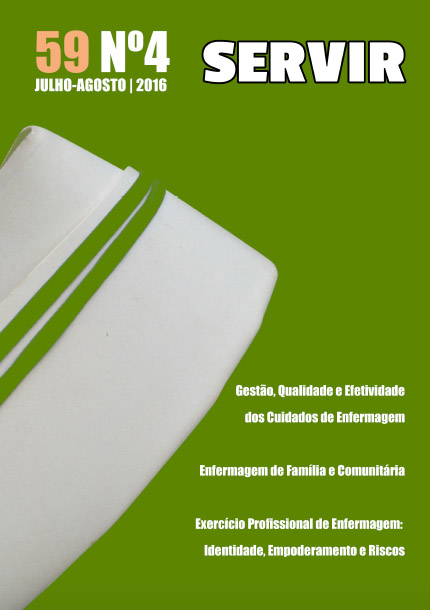Empowerment of nurses
study of some intervening factors
DOI:
https://doi.org/10.48492/servir024.24029Keywords:
Empowerment, Motivation, TrainingAbstract
INTRODUCTION
Empowerment is a process that results in personal and professional empowerment, in the form of acquisition of skills, motivation, satisfaction and decision making. It is linked to professional autonomy and will be materialized in autonomous decisions.
OBJECTIVES
To identify the sociodemographic, socio-professional and of formative context variables that influence the empowerment of nurses.
METHODS
A quantitative, descriptive analytical and correlational study with a non-probabilistic sample of 240 nurses. Data sample from June 2014 to December 2014, with implementation of an instrument composed of a professional and socio-demographic questionnaire: “Perceptions of Empowerment in Midwifery Scale” (Mathews, Scott and Gallagher) and the scale of motivation to professional exercise.
RESULTS
Nurses involved in this survey were aged between 26 and 66 years old. Most of them had a bond, for an indefinite period of time, with the institution to which they were working. They showed good perception on the Empowerment ranging between 50% in the organizational recognition and 100% in recognition by peers. Younger nurses have a better perception of Empowerment in organizational and global recognition by peers, whereas older Nurses have a better perception of Empowerment in the personal dimension. Nurses with master’s degree and doctoral studies have a lower perception on the multidimensional scale of recognition by peers and organizational recognition. 40% of nurses that participated in this study were very motivated.
CONCLUSIONS
Nurses with greater motivation and higher training level have better perception of empowerment and consequently greater decisiveness. These results are to be considered in the management of learning and job environments.
Downloads
References
Albini, L. (2013). Vivenciando o empoderamento do enfermeiro em um hospital de ensino na implementação de modelo gerencial (Tese de doutoramento, Universidade Federal do Paraná). Acedido em http://acervodigital.ufpr.br/handle/1884/35019
Benner, P. (2004). De iniciado a perito. Coimbra: Editora Quarteto.
Bernardino, E., Dyniewicz, A. M., Carvalho, K. L. B., Kalinowski, L. C., & Bonat, W. H. (2013). Adaptação transcultural e validação do instrumento Conditions of Work Effectiveness - Questionnaire- II. Revista Latino-Americana de Enfermagem, 21(5), 7 telas. Acedido em http://www.scielo.br/pdf/rlae/v21n5/pt_0104-1169-rlae-21-05-1112.pdf
Boff, L. (2012). Quem cuida do cuidador? São Leopoldo, RS: Instituto Humanitas Unisinos. Acedido em http://www.ihu.unisinos.br/noticias/509000-quemcuidadocuidador
Correia, M. C. B. (2012). Processo de construção de competências nos enfermeiros em UCI (Tese de doutoramento, Universidade de Lisboa). Acedido em http://repositorio.ul.pt/handle/10451/7992
Covery, S. R. (2014). Os sete hábitos das pessoas altamente eficazes: Lições poderosas para transformação pessoal. Lisboa: Gradiva.
Goleman, D. (2005). Trabalhar com inteligência emocional (3ª ed.). Lisboa: Temas e Debates.
Henriques, C. M. (2012). O empoderamento dos enfermeiros especialistas em enfermagem de saúde materna e obstétrica em Portugal. Madrid: Bubok Publishing.
Hesbeen, W. (2000). Cuidar no hospital: Enquadrar os cuidados de enfermagem numa perspectiva de cuidar. Loures: Lusociência.
Hesbeen, W. (2001). Qualidade em enfermagem: Pensamento e acção na perspectiva do cuidar. Loures: Lusociência.
Martins, M. F. S. V., & Remoaldo, P. C. A. C. (2014). Representações da enfermeira obstetra na perspetiva da mulher grávida. Revista Brasileira de Enfermagem: REBEn, 67(3), 360-365. doi: 10.5935/0034-7167.20140047
Matthews, A., Scott, P. A., & Gallagher, P. (2009). The development and psychometric evaluation of the Perceptions of Empowerment in Midwifery Scale. Midwifery, 25(3), 327-335. Acedido em http://www.sciencedirect.com/science/article/pii/S0266613807000435
Oliveira, U. R., & Rocha, H. M. (2008). Empowerment como estratégia competitiva em manufatura e serviços: Percepção dos colaboradores. Revista Produção Online, 8(3), 1-23. doi: http://dx.doi.org/10.14488/1676-1901.v8i3.109
Porto, A. R. (2011). O empoderamento político dos enfermeiros na prática hospitalar (Dissertação de pós-graduação, Universidade Federal de Pelotas). Acedido em http://wp.ufpel.edu.br/pgenfermagem/files/2015/10/02e74f10e0327ad868d138f2b4fdd6f0.pdf
Quitete, J. B., & Vargens, O. M. C. (2009). O poder no cuidado da enfermeira obstétrica: Empoderamento ou submissão das mulheres usuárias? Revista de Enfermagem UERJ, 17(3), 315- 320. Acedido em http://www.facenf.uerj.br/v17n3/v17n3a03.pdf
Ribeiro, J. M. S (2009). Autonomia profissional dos enfermeiros (Dissertação de mestrado, Universidade do Porto). Acedido em https://repositorio-aberto.up.pt/handle/10216/20083
Salvador, P. T. C. O., Alves, K.Y., Martins, C. C. F., & Santos, E. P. (2013). Motivos para o empoderamento da enfermagem: Reflexões à luz de Alfred Schutz. REME, Revista Mineira de Enfermagem, 17(4), 1014-1019. doi: 10.5935/1415-2762.20130073
Silva, J. M. S. G. (2013). Plano de integração de novos enfermeiros do serviço de urgência geral de um hospital (Dissertação de mestrado, Instituto Politécnico de Setúbal). Acedido em http://comum.rcaap.pt/handle/123456789/4757
Silva, P. J. O. (2012). A formação de enfermeiros em Portugal: Uma cartografia dos discursos presentes (Dissertação de doutoramento, Universidade do Porto). Acedido em http://repositorio-aberto.up.pt/handle/10216/78382
Downloads
Published
How to Cite
Issue
Section
License
In order to promote the free circulation of knowledge, Servir is open access journal. All its content is available and protected under the Creative Commons license (CC BY 4.0).
The journal allows self-archiving in institutional repositories of all versions, which may become immediately available


